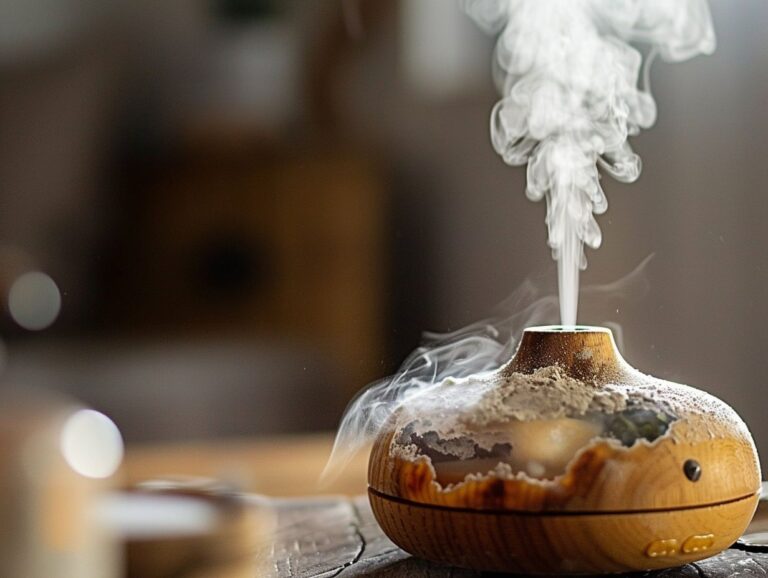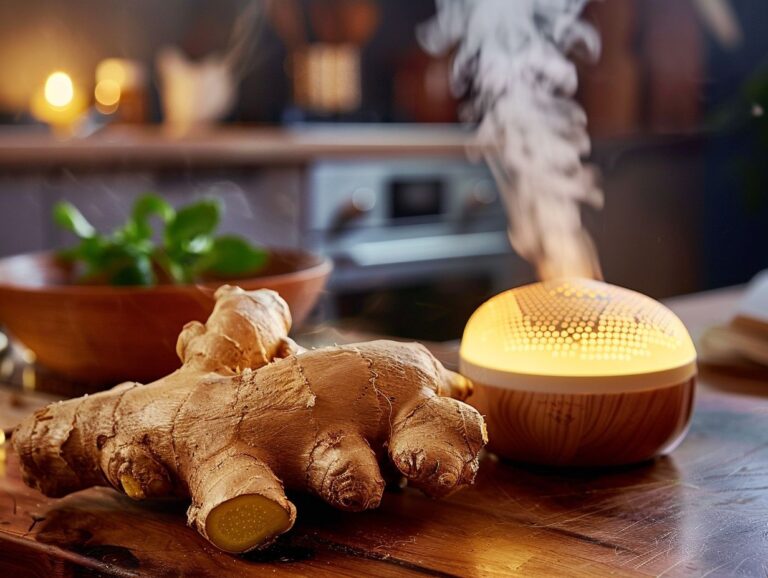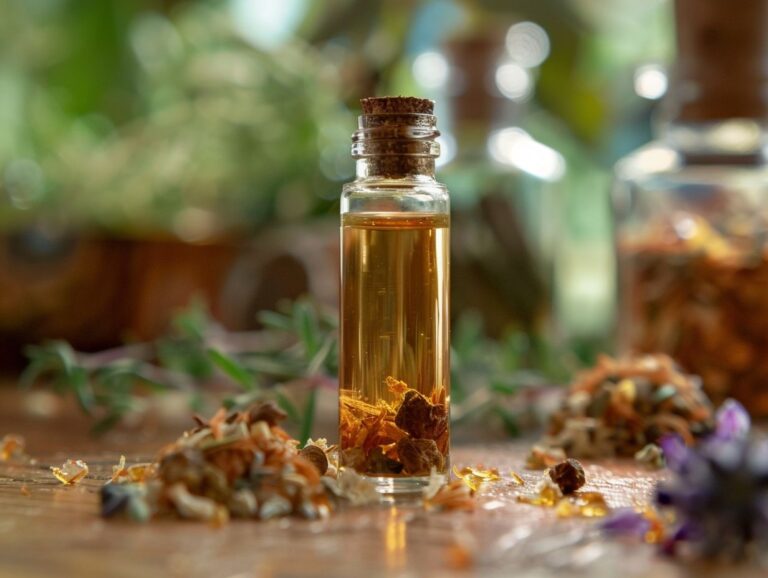What Does Lavender Aromatherapy Do
If you’re looking for a natural way to reduce stress, improve sleep quality, and alleviate headaches, lavender aromatherapy may be just what you need.
We’ll explore the different types of lavender aromatherapy, the benefits it offers, and how you can use it at home. It’s important to note that there are some potential risks and side effects to be aware of.
Read on to learn more about the power of lavender aromatherapy and how it can enhance your overall well-being.
Key Takeaways:
What Is Lavender Aromatherapy?
Lavender aromatherapy is a holistic healing treatment that utilizes the aromatic properties of lavender oil, an essential oil derived from the lavender plant. It is a popular practice in alternative medicine and wellness due to its soothing and calming effects.
The origins of lavender aromatherapy can be traced back centuries, with the ancient Greeks and Romans using lavender for its medicinal and therapeutic benefits. Known for its pleasant fragrance and versatile uses, lavender oil has become a staple in aromatherapy practices worldwide. Its significance in holistic healing lies in its ability to promote relaxation, reduce stress and anxiety, and improve sleep quality.
In modern wellness practices, lavender aromatherapy is commonly used in diffusers, massage oils, bath products, and even skincare formulations. The gentle yet potent scent of lavender oil helps create a tranquil atmosphere, making it a popular choice for promoting mental and emotional well-being.
How Is Lavender Aromatherapy Used?
Lavender aromatherapy is used in various ways, including inhalation, topic application, and ingestion for its therapeutic benefits. The versatility of lavender oil allows for different applications depending on the desired outcome.
Diffusing lavender oil through a diffuser can create a calming ambiance that helps in reducing stress and promoting relaxation.
On the other hand, topical application of diluted lavender oil on the skin can aid in soothing minor skin irritations, such as insect bites or sunburn.
Experts suggest that the cautious and controlled ingestion of lavender oil under professional supervision may support digestive health and help alleviate symptoms like bloating.
What Are the Different Types of Lavender Aromatherapy?
Different types of lavender aromatherapy include lavender oil blends, lavender-infused cosmetic products, and lavender-based therapeutic formulations. These products offer varying concentrations and applications of lavender’s essential oil for diverse benefits.
Among these options, lavender oil blends are popular for their versatility in promoting relaxation, improving sleep quality, and reducing stress. They can be used in diffusers, massage oils, or added to bathwater for a calming experience.
On the other hand, lavender-infused cosmetic products, such as lotions, creams, and shampoos, provide skin and hair benefits while enveloping the user in a soothing lavender fragrance.
Lavender-based therapeutic formulations, like balms, salves, and sprays, are valued for their potential to alleviate headaches, muscle pains, and insect bites due to the natural properties of lavender oil. These products are often used in aromatherapy practices, natural medicine, and skincare routines to harness the benefits of lavender’s calming and healing properties.
What Are the Benefits of Lavender Aromatherapy?
The benefits of lavender aromatherapy are vast, ranging from reducing stress and anxiety to improving sleep quality and alleviating symptoms of depression and menstrual cramps. Scientific evidence supports lavender’s efficacy in promoting overall well-being.
Lavender aromatherapy has been shown to have a calming effect on the nervous system, helping individuals manage stress and anxiety levels effectively. The soothing scent of lavender can aid in inducing a state of relaxation, which in turn, may lead to better sleep patterns and improved sleep quality.
Studies have demonstrated that the aromatic compounds in lavender oil can have a positive impact on mental health conditions like depression, by promoting feelings of positivity and emotional balance.
For women experiencing menstrual discomfort, lavender aromatherapy has been found to help alleviate cramps and other associated symptoms, providing a natural and gentle way to ease discomfort during that time of the month.
Reduces Stress and Anxiety
Lavender aromatherapy is known for its calming effects, making it a popular choice for reducing stress and anxiety. Inhaling lavender oil can promote relaxation and a sense of well-being.
Various studies have shown that the scent of lavender can help lower heart rate and blood pressure, inducing a state of calmness. Its soothing fragrance is believed to interact with neurotransmitters in the brain, such as serotonin, known to regulate mood and emotions.
Not only does lavender provide a natural way to unwind, but it also acts as a gentle sedative, aiding in improving sleep quality and reducing insomnia symptoms. The gentle floral aroma of lavender is often used in massage oils, bath salts, and diffusers to create a peaceful environment conducive to relaxation.
Improves Sleep Quality

Lavender aromatherapy has been shown to improve sleep quality and alleviate symptoms of insomnia. The soothing scent of lavender oil can promote relaxation and aid in achieving restful sleep.
Studies have indicated that inhaling lavender essential oil can help lower heart rate and reduce anxiety levels, creating a conducive environment for falling asleep peacefully. Furthermore, lavender is known for its stress-relieving properties, which can help calm the mind and reduce racing thoughts that often interfere with sleep. Incorporating lavender aromatherapy into a bedtime routine can signal the brain that it is time to unwind, signaling the body to transition into a state of relaxation and readiness for sleep.
Relieves Headaches and Migraines
Lavender aromatherapy is effective in relieving headaches and migraines due to its analgesic properties. Inhaling lavender oil or applying it topically can help alleviate headache symptoms.
The analgesic effects of lavender oil have been found to be beneficial in managing pain associated with headaches and migraines. The soothing aroma of lavender aids in reducing tension and promoting relaxation, which can contribute to easing headache discomfort. Not only does lavender oil possess pain-relieving properties, but it also has anti-inflammatory effects that can help reduce swelling and inflammation that often accompany headaches.
Alleviates Menstrual Cramps
Lavender aromatherapy is known to alleviate menstrual cramps and discomfort during menstruation. The soothing properties of lavender oil can help relax muscles and reduce pain associated with menstrual cramps.
When inhaled or used in massages, lavender oil’s muscle-relaxing effects can provide relief from the intense cramping often experienced by individuals during their menstrual cycles. The scent of lavender has a calming effect on the mind, which can also help in reducing stress and anxiety that may exacerbate menstrual symptoms.
Are There Any Risks or Side Effects of Lavender Aromatherapy?
While lavender aromatherapy is generally safe, there are potential risks and side effects to consider. Skin irritation, allergic reactions, and interactions with medications are among the precautions to be aware of when using lavender oil.
When using lavender oil topically, it’s essential to perform a patch test to check for skin sensitivity before more extensive use. Some individuals may experience redness, itching, or a rash upon contact with the oil. If any adverse reactions occur, it is recommended to discontinue use immediately and seek medical advice.
In addition, lavender oil has been found to interact with certain medications, such as sedatives and blood thinners, potentially intensifying their effects. It’s crucial to consult with a healthcare provider before incorporating lavender oil into your routine, especially if you are taking any medications.
Skin Irritation or Allergic Reactions
Skin irritation and allergic reactions may occur in some individuals using lavender aromatherapy. It is essential to perform a patch test and consult a healthcare provider if adverse skin reactions occur.
When using lavender oil for aromatherapy, significant care should be taken due to the potential for adverse skin reactions. Lavender, a popular essential oil known for its calming effects, can also cause skin sensitivity, especially in those with sensitive skin or preexisting skin conditions such as eczema or dermatitis.
The application of undiluted lavender oil directly onto the skin can lead to irritation, redness, itching, or even more severe allergic responses. To avoid any skin-related risks, dilute the lavender oil with a carrier oil before applying topically, and always conduct a patch test on a small area of skin before widespread use.
Nausea or Headaches
In rare cases, lavender aromatherapy may cause nausea or headaches in sensitive individuals. Monitoring the dosage and discontinuing use in case of adverse symptoms is advised.
Although lavender is generally considered safe and well-tolerated, some people may experience side effects when using it for aromatherapy. Nausea and headaches are relatively uncommon reactions, but they can occur, particularly in individuals with a heightened sensitivity to scents. It’s important for individuals using lavender oil for aromatherapy to start with a low concentration and observe how their body responds. If any adverse effects, such as nausea or headaches, manifest, it is recommended to stop using the oil immediately and consult a healthcare professional for further guidance.
Interactions with Medications

Lavender aromatherapy can interact with certain medications, affecting their efficacy or side effects. It is crucial to consult a healthcare professional before using lavender oil alongside medications.
When lavender oil is used in combination with certain medications, it may alter their absorption, metabolism, or effects on the body. Some medications can have their sedative effects enhanced when taken with lavender oil, potentially leading to increased drowsiness or dizziness. On the flip side, lavender oil might interfere with the way some drugs are broken down in the liver, affecting their effectiveness. Due to these potential interactions, it is vital to seek guidance from a healthcare provider to ensure the safe and appropriate use of lavender aromatherapy alongside medications.
How Can Someone Use Lavender Aromatherapy at Home?
To incorporate lavender aromatherapy at home, individuals can utilize methods such as diffusing essential oil, using lavender-infused products, or creating custom aromatherapy blends. Each approach offers unique benefits and applications.
Diffusion is one of the most popular ways to enjoy the calming effects of lavender. Simply add a few drops of lavender essential oil to a diffuser filled with water and let the soothing aroma fill the room. Alternatively, incorporating lavender-infused products like candles, lotions, or bath salts can bring the benefits of lavender into daily routines. For a more personalized experience, consider blending lavender with complementary oils like chamomile or bergamot to create a unique aromatherapy blend tailored to individual preferences.
Diffusing Essential Oil
Diffusing lavender essential oil is a popular method of enjoying its aromatic benefits at home. Using a diffuser can disperse the calming scent of lavender throughout a room, promoting relaxation.
Not only does the fragrance create a serene ambiance, but lavender oil’s therapeutic properties can also help reduce stress and anxiety. The process of diffusion involves breaking down the oil into tiny molecules that easily evaporate into the air. Once inhaled, these molecules can positively impact the limbic system, the area of the brain responsible for emotions and memory.
Furthermore, aromatherapy with lavender oil is known to improve sleep quality, alleviate headaches, and even boost mood. Many people turn to lavender diffusion as a natural way to unwind after a long day or create a relaxing atmosphere during yoga or meditation sessions.
Using Lavender-Infused Products
Utilizing lavender-infused cosmetic products like lotions, shampoos, and body oils can enhance skincare and hair care routines. The soothing properties of lavender oil contribute to nourishing the skin and promoting hair health.
The calming aroma of lavender can help reduce stress and anxiety, providing a spa-like experience during skincare and hair care routines. Lavender is known for its antibacterial and anti-inflammatory properties, making it a versatile ingredient in combating skin issues like acne and inflammation. Its antioxidant properties also aid in protecting the skin against environmental stressors, preventing premature aging.
Making a Lavender Aromatherapy Blend
Creating a custom lavender aromatherapy blend allows individuals to tailor the concentration and aroma to their preferences.
When crafting your personalized blend, it’s essential to consider the properties of different essential oils and how they synergize with lavender. For example, pairing lavender with soothing chamomile can enhance relaxation, while adding invigorating citrus oils like lemon or bergamot can uplift the blend’s mood-boosting abilities.
Experimenting with various ratios of lavender oil and other essential oils enables you to create a blend that caters specifically to your needs, whether you’re seeking stress relief, better sleep, or heightened focus.
Frequently Asked Questions
What does lavender aromatherapy do?

How does lavender aromatherapy work?
The scent of lavender activates the limbic system, which is responsible for controlling emotions and memories. This can help reduce stress and anxiety, and promote better sleep.
What are the benefits of lavender aromatherapy?
Some of the benefits of lavender aromatherapy include reduced stress and anxiety, improved sleep, and relief from headaches and migraines. It may also help with pain management and improve mood.
Is lavender aromatherapy safe?
Yes, lavender aromatherapy is generally considered safe. However, it is important to dilute the essential oil before use and to avoid applying it directly to the skin. It is also recommended to consult with a healthcare professional before using it if you have any medical conditions.
How can I use lavender aromatherapy?
There are various ways to use lavender aromatherapy, including inhaling the scent through a diffuser, adding a few drops to a bath, or diluting it in a carrier oil for massage. It can also be added to skincare products or used in a room spray.
Are there any side effects of lavender aromatherapy?
In general, lavender aromatherapy is safe and does not have any significant side effects. However, some people may experience skin irritation or allergic reactions. It is always recommended to do a patch test before using any essential oils topically.








One Comment